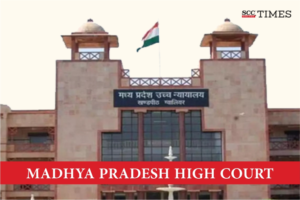Madhya Pradesh High Court: In a writ appeal challenging the Sub-Divisional Magistrate (SDM), and Collector concerning eviction of a senior citizen from a property under the Maintenance and Welfare of Parents and Senior Citizens Act, 2007 (the Act), a division bench of Suresh Kumar Kait, CJ., and Vivek Jain, J., while upholding the eviction order, opined that eviction order was necessary to protect the interests of the senior citizen (Respondent 3) and ensure peaceful living.
In the instant matter, the appellant (son-in-law) married the deceased daughter of respondent 3 (father-in-law), who passed away in 2018. The appellant continued residing in the property owned by respondent 3 as a permissive occupant. Respondent 3 sought eviction, alleging the appellant caused nuisance and did not provide care or support as required under the Act.
The appellant argued that he does not fall under the definition of “children” per Section 2-A of the Act and therefore is not obligated to maintain the senior citizen (respondent 3). It was claimed that the tribunal failed to follow conciliation proceedings before passing an eviction order. It was asserted that the appellant contributed ₹1,00,000 towards house construction (supported by a bank statement). It was also claimed that the property was purchased in the name of respondent 3 only due to the unavailability of loan facilities for the appellant.
However, the respondent argued that the appellant was inducted into the property when his daughter (appellant’s wife) was given the house, but no formal transfer or ownership existed in favor of the appellant. It was contended that the house was purchased by respondent 3 in 2007 and there exists evidence supporting the appellant’s claim of adverse possession or financial contribution. It was contended that the appellant neither provided maintenance nor exhibited cordial relations but caused nuisance. It was further contended that the property was needed for respondent 3’s legitimate financial and medical needs, as he had no regular pension.
The Court stated that though the Act primarily lists sons, daughters, and grandchildren, the Court can interpret the term to include the appellant given the context of his induction into the property as part of the family. The Court stated that the definition in Section 2(a) is broad and can be interpreted to include the appellant after the death of his wife, making him duty-bound to maintain respondent No. 3.
The Court found that the need of respondent 3 for peaceful possession of the property was bona fide and justified under S. 23 of the Act, which allows for the nullification of gratuitous transfers when senior citizens’ needs are demonstrated. The Court further stated that the appellant failed to establish any legal right or agreement proving ownership or adverse possession of the property.
“When the whole facts of the case are examined from said prospective, then there is a senior citizen, he is in need of the property and that need is bonafide and for peaceful purposes, therefore, petitioner having failed to establish any of his rights over the property, is not entitled to continue in the property dehors the orders of the Sub-Divisional Magistrate and the Collector.”
The Court distinguished the case of Sudesh Chhikara v. Ramti Devi, 2022 SCC OnLine SC 1684 and relied instead on Urmila Dixit v. Sunil Sharan Dixit, 2025 SCC OnLine SC 2, which held that “Tribunal under the Act of 2007 is competent to order eviction if it is necessary and expedient to ensure the protection of senior citizen.”
“If the Tribunal under the Act of 2007 does not grant order of possession to the senior citizen, this would defeat the purpose and object of the Act which is to provide speedy, simple and inexpensive remedies for the elderly.”
The Court held that eviction was justified when the senior citizen demonstrated a genuine need for the property. The Court directed the appellant to vacate the property within 30 days, failing which the SHO was instructed to ensure eviction and hand over possession to respondent 3.
[Dilip Marmat v. Collector, 2025 SCC OnLine MP 780, Decided on 27-01-2025]
*Judgment by Chief Justice Suresh Kumar Kait
Advocates who appeared in this case:
Shri Prateek Jain, Counsel for the Appellant
Shri S.S. Chouhan, Govt. Advocate, Counsel for the Respondents/State
Shri N.S. Ruprah, Sr. Advocate with Shri Sachin Shukla, Counsel for the Respondent No. 3

